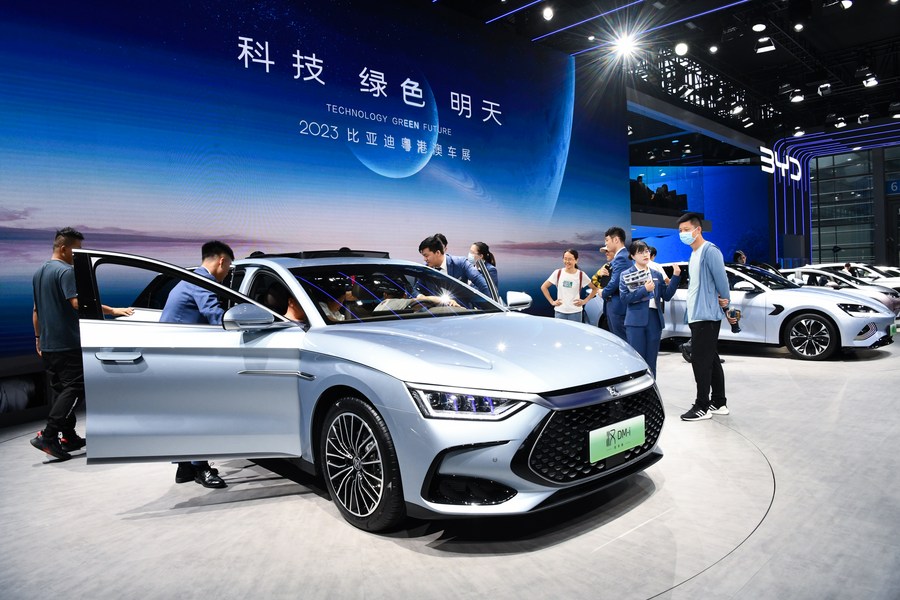
Visitors learn about new energy vehicles of Chinese carmaker BYD during the 27th Guangdong-Hong Kong-Macao Greater Bay Area International Auto Show at the Shenzhen Convention and Exhibition Center in Shenzhen, south China's Guangdong Province, June 16, 2023. (Xinhua/Liang Xu)
BEIJING, Jan. 4 (Xinhua) -- China's new energy vehicle (NEV) manufacturers closed 2023 with better-than-expected performances and optimism for the year ahead, industry insiders have said.
A report from the China Passenger Car Association (CPCA) published on Wednesday has estimated that the country's wholesale NEV sales totaled 8.88 million units in 2023, which would mark a notable expansion of 38 percent year on year.
Leading Chinese NEV manufacturers that have already released their delivery and production figures for 2023 saw significant increases.
Beginning the new year, industry insiders are predicting more powerful growth in the NEV market in 2024. Zhang Yongwei, vice president of electric vehicle industry think tank China EV100, expects the production and sales volumes of Chinese NEVs to ramp up further.
BEATING EXPECTATIONS IN 2023
Although 2023 got off to a weak start with the withdrawal of NEV subsidies that had been in place for 13 years, the NEV market demonstrated resilience and came out strong at the end of December.
Chinese NEV giant BYD concluded the year with a record-breaking sales volume, according to a recent performance report. The company sold over 3.02 million vehicles throughout the year -- a substantial surge of 61.9 percent from the previous year that led BYD to surpass its 3-million annual sales target.
GAC Aion, a NEV subsidiary of GAC Group, logged 77 percent full-year sales growth over 2022 to top 480,000 units, and startup carmaker NIO saw its new car deliveries increase 30.7 percent to over 160,000 units in 2023.
It's worth noting that the overseas markets for China's NEV brands have displayed an upward trend in sync with the domestic market, according to the December CPCA report.
BYD data shows that the company saw its exports grow by about 334 percent to over 240,000 units in 2023, with its reach spanning more than 70 countries and regions on six continents.
SOLID UNDERPINNING FOR 2024
On the basis of 2023's solid fundamentals and various government policies spurring vehicle consumption, the NEV sector is bullish about growth this year.
CPCA Secretary General Cui Dongshu has projected that wholesale sales of Chinese passenger NEVs will surge 22 percent to top 11 million units in 2024, and that the NEV penetration rate will reach 40 percent.
Boosted by the upbeat sentiment, the heads of China's NEV brands have set their sights on loftier goals.
Li Xiang, CEO of emerging carmaker Li Auto, said the company will challenge itself to meet single-month delivery targets of 100,000 units and an annual delivery target of 800,000 units this year, compared with the 50,000-unit and 376,000-unit goals that have been achieved in 2023.
And Chery, another rising automaker in China, is aiming to launch 24 hybrid models and 15 pure electric models in the next two years.
China has been working to unleash its domestic NEV consumption potential at every level over the last year. In a major move, it extended its preferential purchase tax policy for NEVs to the end of 2027 in June 2023.
Individual regions also fleshed out specific incentive measures at the end of last year. Suzhou in Jiangsu Province introduced a digital yuan subsidy policy for car buyers, granting 4,000-yuan (about 563.40 U.S. dollars) subsidies to buyers purchasing vehicles priced between 200,000 yuan and 300,000 yuan, and 6,000-yuan subsidies to those purchasing vehicles priced above 300,000 yuan.
Those familiar with the industry anticipate more competition for Chinese NEV makers in 2024 and 2025, in light of an intensive vehicle model launch schedule and the industry's accelerated pace of product iteration.
"The year 2024 could be a crucial year for China's NEV industry to continue enlarging its presence in the global arena and being a driving force for economic and social development," said Zhang Yongwei.




 A single purchase
A single purchase









